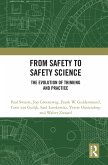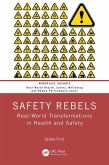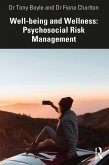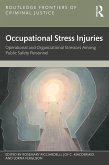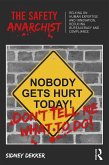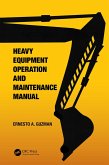Paul Swuste, Jop Groeneweg, Frank W. Guldenmund, Coen van Gulijk, Saul Lemkowitz, Yvette Oostendorp, Walter Zwaard
From Safety to Safety Science (eBook, ePUB)
The Evolution of Thinking and Practice
42,95 €
42,95 €
inkl. MwSt.
Sofort per Download lieferbar

21 °P sammeln
42,95 €
Als Download kaufen

42,95 €
inkl. MwSt.
Sofort per Download lieferbar

21 °P sammeln
Jetzt verschenken
Alle Infos zum eBook verschenken
42,95 €
inkl. MwSt.
Sofort per Download lieferbar
Alle Infos zum eBook verschenken

21 °P sammeln
Paul Swuste, Jop Groeneweg, Frank W. Guldenmund, Coen van Gulijk, Saul Lemkowitz, Yvette Oostendorp, Walter Zwaard
From Safety to Safety Science (eBook, ePUB)
The Evolution of Thinking and Practice
- Format: ePub
- Merkliste
- Auf die Merkliste
- Bewerten Bewerten
- Teilen
- Produkt teilen
- Produkterinnerung
- Produkterinnerung

Bitte loggen Sie sich zunächst in Ihr Kundenkonto ein oder registrieren Sie sich bei
bücher.de, um das eBook-Abo tolino select nutzen zu können.
Hier können Sie sich einloggen
Hier können Sie sich einloggen
Sie sind bereits eingeloggt. Klicken Sie auf 2. tolino select Abo, um fortzufahren.

Bitte loggen Sie sich zunächst in Ihr Kundenkonto ein oder registrieren Sie sich bei bücher.de, um das eBook-Abo tolino select nutzen zu können.
From Safety to Safety Science details 150 years of knowledge development in the safety sciences. This book shows how contemporary crises instigated the development of safety knowledge and how the safety sciences pieced their theories together by research, by experience and by taking ideas from other domains.
- Geräte: eReader
- mit Kopierschutz
- eBook Hilfe
Andere Kunden interessierten sich auch für
![From Safety to Safety Science (eBook, PDF) From Safety to Safety Science (eBook, PDF)]() Paul SwusteFrom Safety to Safety Science (eBook, PDF)42,95 €
Paul SwusteFrom Safety to Safety Science (eBook, PDF)42,95 €![Safety Rebels (eBook, ePUB) Safety Rebels (eBook, ePUB)]() Selma PiricSafety Rebels (eBook, ePUB)47,95 €
Selma PiricSafety Rebels (eBook, ePUB)47,95 €![A Definitive Guide to Behavioural Safety (eBook, ePUB) A Definitive Guide to Behavioural Safety (eBook, ePUB)]() Tim MarshA Definitive Guide to Behavioural Safety (eBook, ePUB)52,95 €
Tim MarshA Definitive Guide to Behavioural Safety (eBook, ePUB)52,95 €![Well-being and Wellness: Psychosocial Risk Management (eBook, ePUB) Well-being and Wellness: Psychosocial Risk Management (eBook, ePUB)]() Tony BoyleWell-being and Wellness: Psychosocial Risk Management (eBook, ePUB)43,95 €
Tony BoyleWell-being and Wellness: Psychosocial Risk Management (eBook, ePUB)43,95 €![Occupational Stress Injuries (eBook, ePUB) Occupational Stress Injuries (eBook, ePUB)]() Occupational Stress Injuries (eBook, ePUB)37,95 €
Occupational Stress Injuries (eBook, ePUB)37,95 €![The Safety Anarchist (eBook, ePUB) The Safety Anarchist (eBook, ePUB)]() Sidney DekkerThe Safety Anarchist (eBook, ePUB)35,95 €
Sidney DekkerThe Safety Anarchist (eBook, ePUB)35,95 €![Heavy Equipment Operation and Maintenance Manual (eBook, ePUB) Heavy Equipment Operation and Maintenance Manual (eBook, ePUB)]() Ernesto A. GuzmanHeavy Equipment Operation and Maintenance Manual (eBook, ePUB)86,95 €
Ernesto A. GuzmanHeavy Equipment Operation and Maintenance Manual (eBook, ePUB)86,95 €-
-
-
From Safety to Safety Science details 150 years of knowledge development in the safety sciences. This book shows how contemporary crises instigated the development of safety knowledge and how the safety sciences pieced their theories together by research, by experience and by taking ideas from other domains.
Hinweis: Dieser Artikel kann nur an eine deutsche Lieferadresse ausgeliefert werden.
Dieser Download kann aus rechtlichen Gründen nur mit Rechnungsadresse in A, B, BG, CY, CZ, D, DK, EW, E, FIN, F, GR, HR, H, IRL, I, LT, L, LR, M, NL, PL, P, R, S, SLO, SK ausgeliefert werden.
Hinweis: Dieser Artikel kann nur an eine deutsche Lieferadresse ausgeliefert werden.
Produktdetails
- Produktdetails
- Verlag: Taylor & Francis eBooks
- Seitenzahl: 430
- Erscheinungstermin: 29. November 2021
- Englisch
- ISBN-13: 9781000486810
- Artikelnr.: 62940538
- Verlag: Taylor & Francis eBooks
- Seitenzahl: 430
- Erscheinungstermin: 29. November 2021
- Englisch
- ISBN-13: 9781000486810
- Artikelnr.: 62940538
- Herstellerkennzeichnung Die Herstellerinformationen sind derzeit nicht verfügbar.
Paul Swuste is an associate professor of the Safety Science Group, Delft University of Technology, the Netherlands, with an MSc degree in Biochemistry (Leiden University, 1978) and a PhD thesis, 'Occupational Hazards and Solutions' (Delft University of Technology, 1996). He has conducted research on risk assessments in high-tech-high-hazard industries, on the history of knowledge developments in safety science and on various occupational hazards. He has published frequently on these topics and co-organised the post-graduate master course 'Management of Safety Health and Environment' from 1994 to 2008.
Jop Groeneweg graduated as a cognitive psychologist from Leiden University in the early 1980s. In a career spanning about four decennia, he was involved in many projects, in and outside the university, to improve safety, predominantly in industrial organisations. As a professor of Safety in Healthcare at Delft University of Technology and a human performance expert at Leiden University and the TNO research institute, in the Netherlands, he aims to transfer his knowledge to the medical domain to reduce preventable adverse events while at the same time getting new insights that might help to further improve safety in the industry.
Frank W. Guldenmund graduated from Leiden University with degrees in both cognitive psychology and methods and statistics. In February 1992 he joined the Safety Science Group at Delft University of Technology. In his research, he focusses on the management of safety in industrial organisations and on the behavior of people within those organisations. He has been teaching safety science for nearly 30 years to both graduate and undergraduate students as well as to safety practitioners. Since 2002 he has been a trainer in the safety culture program of the International Atomic Energy Agency (IAEA), providing lectures and workshops on this topic worldwide. Currently, he is on the board of the Dutch Society for Safety Professionals (NVVK) and responsible for embedding (more) science into the work of safety professionals. He is editor of the society's journal as well as associate editor of Safety Science.
Coen van Gulijk is a senior scientist at TNO Healthy Living, a vising professor at the University of Huddersfield and affiliate researcher of the Safety Science Group of the Delft University of Technology. He is investigating and accelerating the digital transformation of safety models and safety management. He has taught safety science on an academic level in four universities in the Netherlands, one university in Belgium and one in the UK, and actively engages in international networks and scientific dissemination.
Saul Lemkowitz was an associate professor of the Chemical Engineering department at Delft University of Technology. He studied chemical engineering at Rutgers University, in the United States, and at Delft. His PhD thesis (Delft, 1975) focused on 'Phase and corrosion studies of the ammonia-carbon dioxide water system'. Dust explosions and explosion safety in the process industries were his fields of research and education, together with sustainability, industrial ecology and technology and society. He frequently published on these topics. Regrettably, Saul passed away on 13 February 2020.
Yvette Oostendorp finished her master's studies at Wageningen University and Research in environmental and industrial hygiene in 1983 and worked as a researcher at Wageningen UR on agreement between qualitative estimates and quantitative exposure measurements. From 1986 until 2004 she worked as an industrial hygienist at an occupational health service. She is author or co-author of several handbooks on chemical risk assessment for professionals in occupational health services. In 2004 she started as a senior advisor at the former Hazardous Substances Council, the advisory council for the Dutch parliament. Since 2012 she has worked at the Dutch Council for Environment and Infrastructure (RLI).
Walter Zwaard studied chemistry at Leiden University and received his PhD in 1983. He worked at Leiden University as risk manager, radiation safety officer and lecturer on laboratory safety. From 2004 until 2012 he was a member of the former Hazardous Substances Council. He has published widely on safety issues such as hazardous substances, accident prevention and risk management. He has written a number of books and edited several textbooks on safety. Since 1992 he has worked as a safety practitioner and consultant in both public and private sectors. As an instructor and lecturer, he participates in many courses for risk professionals.
Jop Groeneweg graduated as a cognitive psychologist from Leiden University in the early 1980s. In a career spanning about four decennia, he was involved in many projects, in and outside the university, to improve safety, predominantly in industrial organisations. As a professor of Safety in Healthcare at Delft University of Technology and a human performance expert at Leiden University and the TNO research institute, in the Netherlands, he aims to transfer his knowledge to the medical domain to reduce preventable adverse events while at the same time getting new insights that might help to further improve safety in the industry.
Frank W. Guldenmund graduated from Leiden University with degrees in both cognitive psychology and methods and statistics. In February 1992 he joined the Safety Science Group at Delft University of Technology. In his research, he focusses on the management of safety in industrial organisations and on the behavior of people within those organisations. He has been teaching safety science for nearly 30 years to both graduate and undergraduate students as well as to safety practitioners. Since 2002 he has been a trainer in the safety culture program of the International Atomic Energy Agency (IAEA), providing lectures and workshops on this topic worldwide. Currently, he is on the board of the Dutch Society for Safety Professionals (NVVK) and responsible for embedding (more) science into the work of safety professionals. He is editor of the society's journal as well as associate editor of Safety Science.
Coen van Gulijk is a senior scientist at TNO Healthy Living, a vising professor at the University of Huddersfield and affiliate researcher of the Safety Science Group of the Delft University of Technology. He is investigating and accelerating the digital transformation of safety models and safety management. He has taught safety science on an academic level in four universities in the Netherlands, one university in Belgium and one in the UK, and actively engages in international networks and scientific dissemination.
Saul Lemkowitz was an associate professor of the Chemical Engineering department at Delft University of Technology. He studied chemical engineering at Rutgers University, in the United States, and at Delft. His PhD thesis (Delft, 1975) focused on 'Phase and corrosion studies of the ammonia-carbon dioxide water system'. Dust explosions and explosion safety in the process industries were his fields of research and education, together with sustainability, industrial ecology and technology and society. He frequently published on these topics. Regrettably, Saul passed away on 13 February 2020.
Yvette Oostendorp finished her master's studies at Wageningen University and Research in environmental and industrial hygiene in 1983 and worked as a researcher at Wageningen UR on agreement between qualitative estimates and quantitative exposure measurements. From 1986 until 2004 she worked as an industrial hygienist at an occupational health service. She is author or co-author of several handbooks on chemical risk assessment for professionals in occupational health services. In 2004 she started as a senior advisor at the former Hazardous Substances Council, the advisory council for the Dutch parliament. Since 2012 she has worked at the Dutch Council for Environment and Infrastructure (RLI).
Walter Zwaard studied chemistry at Leiden University and received his PhD in 1983. He worked at Leiden University as risk manager, radiation safety officer and lecturer on laboratory safety. From 2004 until 2012 he was a member of the former Hazardous Substances Council. He has published widely on safety issues such as hazardous substances, accident prevention and risk management. He has written a number of books and edited several textbooks on safety. Since 1992 he has worked as a safety practitioner and consultant in both public and private sectors. As an instructor and lecturer, he participates in many courses for risk professionals.
TIME TRAVEL
CHAPTER 1 THE BIRTH OF OCCUPATIONAL SAFETY, SAFETY AND SOCIAL STRUGGLE:
1800s-1910
UNITED KINGDOM
The century of steam
UNITED STATES
US Steel, road to happiness
The Pittsburgh investigation
Eastman's conclusions
Responsibility for safety
THE NETHERLANDS
The Netherlands during the century of steam
Safety technique according to Westerouwen van Meeteren
Heijermans' causes of occupational accidents
CHAPTER 2 ACCIDENT PRONENESS, SAFETY BY INSPECTION: 1910-1930
UNITED STATES
The American management approach
Behavioural management
Safety technique
Safety publications
Professionalisation of occupational safety
Safety management according to DeBlois
Heinrich's influence
Safety propaganda
UNITED KINGDOM
Safety research
Accident proneness
The individual hypothesis
Between thinking and doing
The environmental hypothesis
THE NETHERLANDS
Individual factors
CHAPTER 3 DOMINOS, SAFETY BY TECHNIQUE - PREVENTION: 1931-1950
UNITED STATES
Heinrich's contribution
The domino metaphor
The National Safety Council
The role of the foreman
Accident investigation, chance and effect
Criticism on Heinrich
The epidemiological triangle
UNITED KINGDOM
Accidents and their prevention
THE NETHERLANDS
Limited knowledge development
Safety museum
Safety inspectors
CHAPTER 4 PREVENTION, BEHAVIOUR AND THE MAKEABLE MAN: 1950 - 1970
UNITED STATES
Modern management
Quality control, product versus process
The latter days of Heinrich
Damage control
Criticism on the psychological explanation of accidents
The hazard-barrier-target model
The concept of risk
Reliability engineering
Ergonomics
Loss prevention and safety tools, FMEA, FTA, Energy Analysis
UNITED KINGDOM
Safety tool, Hazop
Human factors and ergonomics
THE NETHERLANDS
Task dynamics, a safety theory
Focus on occupational safety
The Lateiner method
Workers' participation
Ergonomics and housekeeping
CHAPTER 5 RISK, SAFETY AND ORGANISATION - MANAGEMENT: 1970-1990
WESTERN EUROPE AND THE NORDIC CONTRIES
Quality of legal provisions for occupational management
Models of occupational safety
Ergonomics and task dynamics
Causes and prevention of 2,000 accidents
Occupational safety research in the 1980s
NORTH AMERICA
Structures of organisations
Risk homeostasis
Occupational safety research in the 1980s
Prevention of accidents
Occupational safety management systems and auditing
Workers' well-being
Safety and changing technology
THE NETHERLANDS
Human error
Risk and occupational safety
Acceptability of risks, standards for occupational exposure to carcinogens
Humanisation of labour
CHAPTER 6 RISK AND MANAGEMENT, SAFETY BY ORGANISATION: 1960-1990
WESTERN EUROPE AND THE NORDIC COUTRIES
Some major industrial accidents in the 1960s and 1970s
Feyzin, 1966
Aberfan, 1966
Flixborough, 1974
Seveso, 1976
Los Alfaques, 1978
How safety changed after these major industrial accidents
The nuclear sector
Loss Prevention
Canvey Island study
Inherent safe design
Seveso I
The Disaster Incubation Theory
Man-machine interactions
Some major industrial accidents in the 1980s
Chernobyl, 1986
Piper Alpha, 1988
Clapham Junction, 1988
NORTH AMERICA, INDIA AND THE FORMER USSR
Management Oversight Risk Tree
Some major industrial accidents in the 1970s and 1980s
Three Mile Island, 1979
Mexico City, 1984
Bhopal, 1984
How safety changed after these major industrial accidents
Risk approach and risk perception
Normal accidents
Man-machine interactions THERP and high reliability theory
Safety management
THE NETHERLANDS
Some major industrial accidents in the 1960s and 1970s
Shell Pernis, 1968
DSM Beek, 1975
NAM Schoonebeek, 1976
How safety changed after these major industrial accidents
Impact of vapour gas explosions
Fighting blow-outs
Loss Prevention
Origin of the Dutch risk concept
COVO study, LPG study
Coloured books
Broad Societal Discussion
Research on risk perception
The Shell casus
University Training and Research in Safety
CHAPTER 7 OCCUPATIONAL SAFETY, SAFETY MANAGEMENT, CULTURE: 1990-2010
WESTERN EUROPE AND NORDIC COUNTRIES
Quality management
Safety management
The accident process
Accident models
Working-on-safety
Safety culture and safety climate
NORTH AMERICA AND AUSTRALIA
Quality management
Organisational learning
Safety audits
Safety interventions
Organisational culture
THE NETHERLANDS
Organisational learning
The concept of well-being
ISO madness
Risk assessment and evaluation
Accidents and accident models
Safety interventions
Safety culture
CHAPTER 8 HIGH-TECH-HIGH-HAZARD SAFETY, CULTURE AND RISK: 1990¿2010
General management schools
Risk
Accidents in high-tech-high-hazard sectors
Domino effects
Golden years of safety
WESTERN EUROPE AND NORDIC COUNTRIES
Determinants of major accident processes
Sloppy management
Complexity and socio-technical systems
Gas clouds
Human failure and human factors
Safety culture and inspections
Design
Metaphors
Swiss cheese
Drift to danger
Models and theories
Disaster incubation theory
Resilience engineering workshop
Risk perception
Risk and safety management
NORTH AMERICA AND AUSTRALIA
Determinants of major accident processes
Design, Layers of Protection Analysis (LOPA)
Design, process intensification
Theories
Normal accident theory
High reliability theory
Case studies
Risk perception
THE NETHERLANDS
Determinants of major accident processes
Metaphors
Bowtie
Quantification of risk
Acceptable risk levels
Risk perception
Risk and safety management
Deepwater Horizon
CHAPTER 9 EPILOGUE
Acts of God
The individual and environmental hypotheses, pre-war period
Hazards and unsafe acts, pre-war period
Occupational safety, post-war period
Management and safety management, post-war period
Ergonomics, post-war period
The environmental and individual hypotheses, post-war period
High-tech-high-hazard safety, post-war period
Organisational factors
The combination of technology, behaviour and organisation
Safety and risk management
Risk and risk perception
Again theories, models and metaphors
The fruits of progress
Worrying between thinking and doing
Safety as a science?
Room for optimism
The time traveller again
Optimise or innovate?
The need for cooperation
Sorcery
Appendix 1: Reported 'man-made' incidents and major accidents from public
literature, 1990-2010
Appendix 2: High-tech high hazard safety, 1950-2010
Appendix 3: Occupational safety, 1800s-2010
References
Index
CHAPTER 1 THE BIRTH OF OCCUPATIONAL SAFETY, SAFETY AND SOCIAL STRUGGLE:
1800s-1910
UNITED KINGDOM
The century of steam
UNITED STATES
US Steel, road to happiness
The Pittsburgh investigation
Eastman's conclusions
Responsibility for safety
THE NETHERLANDS
The Netherlands during the century of steam
Safety technique according to Westerouwen van Meeteren
Heijermans' causes of occupational accidents
CHAPTER 2 ACCIDENT PRONENESS, SAFETY BY INSPECTION: 1910-1930
UNITED STATES
The American management approach
Behavioural management
Safety technique
Safety publications
Professionalisation of occupational safety
Safety management according to DeBlois
Heinrich's influence
Safety propaganda
UNITED KINGDOM
Safety research
Accident proneness
The individual hypothesis
Between thinking and doing
The environmental hypothesis
THE NETHERLANDS
Individual factors
CHAPTER 3 DOMINOS, SAFETY BY TECHNIQUE - PREVENTION: 1931-1950
UNITED STATES
Heinrich's contribution
The domino metaphor
The National Safety Council
The role of the foreman
Accident investigation, chance and effect
Criticism on Heinrich
The epidemiological triangle
UNITED KINGDOM
Accidents and their prevention
THE NETHERLANDS
Limited knowledge development
Safety museum
Safety inspectors
CHAPTER 4 PREVENTION, BEHAVIOUR AND THE MAKEABLE MAN: 1950 - 1970
UNITED STATES
Modern management
Quality control, product versus process
The latter days of Heinrich
Damage control
Criticism on the psychological explanation of accidents
The hazard-barrier-target model
The concept of risk
Reliability engineering
Ergonomics
Loss prevention and safety tools, FMEA, FTA, Energy Analysis
UNITED KINGDOM
Safety tool, Hazop
Human factors and ergonomics
THE NETHERLANDS
Task dynamics, a safety theory
Focus on occupational safety
The Lateiner method
Workers' participation
Ergonomics and housekeeping
CHAPTER 5 RISK, SAFETY AND ORGANISATION - MANAGEMENT: 1970-1990
WESTERN EUROPE AND THE NORDIC CONTRIES
Quality of legal provisions for occupational management
Models of occupational safety
Ergonomics and task dynamics
Causes and prevention of 2,000 accidents
Occupational safety research in the 1980s
NORTH AMERICA
Structures of organisations
Risk homeostasis
Occupational safety research in the 1980s
Prevention of accidents
Occupational safety management systems and auditing
Workers' well-being
Safety and changing technology
THE NETHERLANDS
Human error
Risk and occupational safety
Acceptability of risks, standards for occupational exposure to carcinogens
Humanisation of labour
CHAPTER 6 RISK AND MANAGEMENT, SAFETY BY ORGANISATION: 1960-1990
WESTERN EUROPE AND THE NORDIC COUTRIES
Some major industrial accidents in the 1960s and 1970s
Feyzin, 1966
Aberfan, 1966
Flixborough, 1974
Seveso, 1976
Los Alfaques, 1978
How safety changed after these major industrial accidents
The nuclear sector
Loss Prevention
Canvey Island study
Inherent safe design
Seveso I
The Disaster Incubation Theory
Man-machine interactions
Some major industrial accidents in the 1980s
Chernobyl, 1986
Piper Alpha, 1988
Clapham Junction, 1988
NORTH AMERICA, INDIA AND THE FORMER USSR
Management Oversight Risk Tree
Some major industrial accidents in the 1970s and 1980s
Three Mile Island, 1979
Mexico City, 1984
Bhopal, 1984
How safety changed after these major industrial accidents
Risk approach and risk perception
Normal accidents
Man-machine interactions THERP and high reliability theory
Safety management
THE NETHERLANDS
Some major industrial accidents in the 1960s and 1970s
Shell Pernis, 1968
DSM Beek, 1975
NAM Schoonebeek, 1976
How safety changed after these major industrial accidents
Impact of vapour gas explosions
Fighting blow-outs
Loss Prevention
Origin of the Dutch risk concept
COVO study, LPG study
Coloured books
Broad Societal Discussion
Research on risk perception
The Shell casus
University Training and Research in Safety
CHAPTER 7 OCCUPATIONAL SAFETY, SAFETY MANAGEMENT, CULTURE: 1990-2010
WESTERN EUROPE AND NORDIC COUNTRIES
Quality management
Safety management
The accident process
Accident models
Working-on-safety
Safety culture and safety climate
NORTH AMERICA AND AUSTRALIA
Quality management
Organisational learning
Safety audits
Safety interventions
Organisational culture
THE NETHERLANDS
Organisational learning
The concept of well-being
ISO madness
Risk assessment and evaluation
Accidents and accident models
Safety interventions
Safety culture
CHAPTER 8 HIGH-TECH-HIGH-HAZARD SAFETY, CULTURE AND RISK: 1990¿2010
General management schools
Risk
Accidents in high-tech-high-hazard sectors
Domino effects
Golden years of safety
WESTERN EUROPE AND NORDIC COUNTRIES
Determinants of major accident processes
Sloppy management
Complexity and socio-technical systems
Gas clouds
Human failure and human factors
Safety culture and inspections
Design
Metaphors
Swiss cheese
Drift to danger
Models and theories
Disaster incubation theory
Resilience engineering workshop
Risk perception
Risk and safety management
NORTH AMERICA AND AUSTRALIA
Determinants of major accident processes
Design, Layers of Protection Analysis (LOPA)
Design, process intensification
Theories
Normal accident theory
High reliability theory
Case studies
Risk perception
THE NETHERLANDS
Determinants of major accident processes
Metaphors
Bowtie
Quantification of risk
Acceptable risk levels
Risk perception
Risk and safety management
Deepwater Horizon
CHAPTER 9 EPILOGUE
Acts of God
The individual and environmental hypotheses, pre-war period
Hazards and unsafe acts, pre-war period
Occupational safety, post-war period
Management and safety management, post-war period
Ergonomics, post-war period
The environmental and individual hypotheses, post-war period
High-tech-high-hazard safety, post-war period
Organisational factors
The combination of technology, behaviour and organisation
Safety and risk management
Risk and risk perception
Again theories, models and metaphors
The fruits of progress
Worrying between thinking and doing
Safety as a science?
Room for optimism
The time traveller again
Optimise or innovate?
The need for cooperation
Sorcery
Appendix 1: Reported 'man-made' incidents and major accidents from public
literature, 1990-2010
Appendix 2: High-tech high hazard safety, 1950-2010
Appendix 3: Occupational safety, 1800s-2010
References
Index
TIME TRAVEL
CHAPTER 1 THE BIRTH OF OCCUPATIONAL SAFETY, SAFETY AND SOCIAL STRUGGLE:
1800s-1910
UNITED KINGDOM
The century of steam
UNITED STATES
US Steel, road to happiness
The Pittsburgh investigation
Eastman's conclusions
Responsibility for safety
THE NETHERLANDS
The Netherlands during the century of steam
Safety technique according to Westerouwen van Meeteren
Heijermans' causes of occupational accidents
CHAPTER 2 ACCIDENT PRONENESS, SAFETY BY INSPECTION: 1910-1930
UNITED STATES
The American management approach
Behavioural management
Safety technique
Safety publications
Professionalisation of occupational safety
Safety management according to DeBlois
Heinrich's influence
Safety propaganda
UNITED KINGDOM
Safety research
Accident proneness
The individual hypothesis
Between thinking and doing
The environmental hypothesis
THE NETHERLANDS
Individual factors
CHAPTER 3 DOMINOS, SAFETY BY TECHNIQUE - PREVENTION: 1931-1950
UNITED STATES
Heinrich's contribution
The domino metaphor
The National Safety Council
The role of the foreman
Accident investigation, chance and effect
Criticism on Heinrich
The epidemiological triangle
UNITED KINGDOM
Accidents and their prevention
THE NETHERLANDS
Limited knowledge development
Safety museum
Safety inspectors
CHAPTER 4 PREVENTION, BEHAVIOUR AND THE MAKEABLE MAN: 1950 - 1970
UNITED STATES
Modern management
Quality control, product versus process
The latter days of Heinrich
Damage control
Criticism on the psychological explanation of accidents
The hazard-barrier-target model
The concept of risk
Reliability engineering
Ergonomics
Loss prevention and safety tools, FMEA, FTA, Energy Analysis
UNITED KINGDOM
Safety tool, Hazop
Human factors and ergonomics
THE NETHERLANDS
Task dynamics, a safety theory
Focus on occupational safety
The Lateiner method
Workers' participation
Ergonomics and housekeeping
CHAPTER 5 RISK, SAFETY AND ORGANISATION - MANAGEMENT: 1970-1990
WESTERN EUROPE AND THE NORDIC CONTRIES
Quality of legal provisions for occupational management
Models of occupational safety
Ergonomics and task dynamics
Causes and prevention of 2,000 accidents
Occupational safety research in the 1980s
NORTH AMERICA
Structures of organisations
Risk homeostasis
Occupational safety research in the 1980s
Prevention of accidents
Occupational safety management systems and auditing
Workers' well-being
Safety and changing technology
THE NETHERLANDS
Human error
Risk and occupational safety
Acceptability of risks, standards for occupational exposure to carcinogens
Humanisation of labour
CHAPTER 6 RISK AND MANAGEMENT, SAFETY BY ORGANISATION: 1960-1990
WESTERN EUROPE AND THE NORDIC COUTRIES
Some major industrial accidents in the 1960s and 1970s
Feyzin, 1966
Aberfan, 1966
Flixborough, 1974
Seveso, 1976
Los Alfaques, 1978
How safety changed after these major industrial accidents
The nuclear sector
Loss Prevention
Canvey Island study
Inherent safe design
Seveso I
The Disaster Incubation Theory
Man-machine interactions
Some major industrial accidents in the 1980s
Chernobyl, 1986
Piper Alpha, 1988
Clapham Junction, 1988
NORTH AMERICA, INDIA AND THE FORMER USSR
Management Oversight Risk Tree
Some major industrial accidents in the 1970s and 1980s
Three Mile Island, 1979
Mexico City, 1984
Bhopal, 1984
How safety changed after these major industrial accidents
Risk approach and risk perception
Normal accidents
Man-machine interactions THERP and high reliability theory
Safety management
THE NETHERLANDS
Some major industrial accidents in the 1960s and 1970s
Shell Pernis, 1968
DSM Beek, 1975
NAM Schoonebeek, 1976
How safety changed after these major industrial accidents
Impact of vapour gas explosions
Fighting blow-outs
Loss Prevention
Origin of the Dutch risk concept
COVO study, LPG study
Coloured books
Broad Societal Discussion
Research on risk perception
The Shell casus
University Training and Research in Safety
CHAPTER 7 OCCUPATIONAL SAFETY, SAFETY MANAGEMENT, CULTURE: 1990-2010
WESTERN EUROPE AND NORDIC COUNTRIES
Quality management
Safety management
The accident process
Accident models
Working-on-safety
Safety culture and safety climate
NORTH AMERICA AND AUSTRALIA
Quality management
Organisational learning
Safety audits
Safety interventions
Organisational culture
THE NETHERLANDS
Organisational learning
The concept of well-being
ISO madness
Risk assessment and evaluation
Accidents and accident models
Safety interventions
Safety culture
CHAPTER 8 HIGH-TECH-HIGH-HAZARD SAFETY, CULTURE AND RISK: 1990¿2010
General management schools
Risk
Accidents in high-tech-high-hazard sectors
Domino effects
Golden years of safety
WESTERN EUROPE AND NORDIC COUNTRIES
Determinants of major accident processes
Sloppy management
Complexity and socio-technical systems
Gas clouds
Human failure and human factors
Safety culture and inspections
Design
Metaphors
Swiss cheese
Drift to danger
Models and theories
Disaster incubation theory
Resilience engineering workshop
Risk perception
Risk and safety management
NORTH AMERICA AND AUSTRALIA
Determinants of major accident processes
Design, Layers of Protection Analysis (LOPA)
Design, process intensification
Theories
Normal accident theory
High reliability theory
Case studies
Risk perception
THE NETHERLANDS
Determinants of major accident processes
Metaphors
Bowtie
Quantification of risk
Acceptable risk levels
Risk perception
Risk and safety management
Deepwater Horizon
CHAPTER 9 EPILOGUE
Acts of God
The individual and environmental hypotheses, pre-war period
Hazards and unsafe acts, pre-war period
Occupational safety, post-war period
Management and safety management, post-war period
Ergonomics, post-war period
The environmental and individual hypotheses, post-war period
High-tech-high-hazard safety, post-war period
Organisational factors
The combination of technology, behaviour and organisation
Safety and risk management
Risk and risk perception
Again theories, models and metaphors
The fruits of progress
Worrying between thinking and doing
Safety as a science?
Room for optimism
The time traveller again
Optimise or innovate?
The need for cooperation
Sorcery
Appendix 1: Reported 'man-made' incidents and major accidents from public
literature, 1990-2010
Appendix 2: High-tech high hazard safety, 1950-2010
Appendix 3: Occupational safety, 1800s-2010
References
Index
CHAPTER 1 THE BIRTH OF OCCUPATIONAL SAFETY, SAFETY AND SOCIAL STRUGGLE:
1800s-1910
UNITED KINGDOM
The century of steam
UNITED STATES
US Steel, road to happiness
The Pittsburgh investigation
Eastman's conclusions
Responsibility for safety
THE NETHERLANDS
The Netherlands during the century of steam
Safety technique according to Westerouwen van Meeteren
Heijermans' causes of occupational accidents
CHAPTER 2 ACCIDENT PRONENESS, SAFETY BY INSPECTION: 1910-1930
UNITED STATES
The American management approach
Behavioural management
Safety technique
Safety publications
Professionalisation of occupational safety
Safety management according to DeBlois
Heinrich's influence
Safety propaganda
UNITED KINGDOM
Safety research
Accident proneness
The individual hypothesis
Between thinking and doing
The environmental hypothesis
THE NETHERLANDS
Individual factors
CHAPTER 3 DOMINOS, SAFETY BY TECHNIQUE - PREVENTION: 1931-1950
UNITED STATES
Heinrich's contribution
The domino metaphor
The National Safety Council
The role of the foreman
Accident investigation, chance and effect
Criticism on Heinrich
The epidemiological triangle
UNITED KINGDOM
Accidents and their prevention
THE NETHERLANDS
Limited knowledge development
Safety museum
Safety inspectors
CHAPTER 4 PREVENTION, BEHAVIOUR AND THE MAKEABLE MAN: 1950 - 1970
UNITED STATES
Modern management
Quality control, product versus process
The latter days of Heinrich
Damage control
Criticism on the psychological explanation of accidents
The hazard-barrier-target model
The concept of risk
Reliability engineering
Ergonomics
Loss prevention and safety tools, FMEA, FTA, Energy Analysis
UNITED KINGDOM
Safety tool, Hazop
Human factors and ergonomics
THE NETHERLANDS
Task dynamics, a safety theory
Focus on occupational safety
The Lateiner method
Workers' participation
Ergonomics and housekeeping
CHAPTER 5 RISK, SAFETY AND ORGANISATION - MANAGEMENT: 1970-1990
WESTERN EUROPE AND THE NORDIC CONTRIES
Quality of legal provisions for occupational management
Models of occupational safety
Ergonomics and task dynamics
Causes and prevention of 2,000 accidents
Occupational safety research in the 1980s
NORTH AMERICA
Structures of organisations
Risk homeostasis
Occupational safety research in the 1980s
Prevention of accidents
Occupational safety management systems and auditing
Workers' well-being
Safety and changing technology
THE NETHERLANDS
Human error
Risk and occupational safety
Acceptability of risks, standards for occupational exposure to carcinogens
Humanisation of labour
CHAPTER 6 RISK AND MANAGEMENT, SAFETY BY ORGANISATION: 1960-1990
WESTERN EUROPE AND THE NORDIC COUTRIES
Some major industrial accidents in the 1960s and 1970s
Feyzin, 1966
Aberfan, 1966
Flixborough, 1974
Seveso, 1976
Los Alfaques, 1978
How safety changed after these major industrial accidents
The nuclear sector
Loss Prevention
Canvey Island study
Inherent safe design
Seveso I
The Disaster Incubation Theory
Man-machine interactions
Some major industrial accidents in the 1980s
Chernobyl, 1986
Piper Alpha, 1988
Clapham Junction, 1988
NORTH AMERICA, INDIA AND THE FORMER USSR
Management Oversight Risk Tree
Some major industrial accidents in the 1970s and 1980s
Three Mile Island, 1979
Mexico City, 1984
Bhopal, 1984
How safety changed after these major industrial accidents
Risk approach and risk perception
Normal accidents
Man-machine interactions THERP and high reliability theory
Safety management
THE NETHERLANDS
Some major industrial accidents in the 1960s and 1970s
Shell Pernis, 1968
DSM Beek, 1975
NAM Schoonebeek, 1976
How safety changed after these major industrial accidents
Impact of vapour gas explosions
Fighting blow-outs
Loss Prevention
Origin of the Dutch risk concept
COVO study, LPG study
Coloured books
Broad Societal Discussion
Research on risk perception
The Shell casus
University Training and Research in Safety
CHAPTER 7 OCCUPATIONAL SAFETY, SAFETY MANAGEMENT, CULTURE: 1990-2010
WESTERN EUROPE AND NORDIC COUNTRIES
Quality management
Safety management
The accident process
Accident models
Working-on-safety
Safety culture and safety climate
NORTH AMERICA AND AUSTRALIA
Quality management
Organisational learning
Safety audits
Safety interventions
Organisational culture
THE NETHERLANDS
Organisational learning
The concept of well-being
ISO madness
Risk assessment and evaluation
Accidents and accident models
Safety interventions
Safety culture
CHAPTER 8 HIGH-TECH-HIGH-HAZARD SAFETY, CULTURE AND RISK: 1990¿2010
General management schools
Risk
Accidents in high-tech-high-hazard sectors
Domino effects
Golden years of safety
WESTERN EUROPE AND NORDIC COUNTRIES
Determinants of major accident processes
Sloppy management
Complexity and socio-technical systems
Gas clouds
Human failure and human factors
Safety culture and inspections
Design
Metaphors
Swiss cheese
Drift to danger
Models and theories
Disaster incubation theory
Resilience engineering workshop
Risk perception
Risk and safety management
NORTH AMERICA AND AUSTRALIA
Determinants of major accident processes
Design, Layers of Protection Analysis (LOPA)
Design, process intensification
Theories
Normal accident theory
High reliability theory
Case studies
Risk perception
THE NETHERLANDS
Determinants of major accident processes
Metaphors
Bowtie
Quantification of risk
Acceptable risk levels
Risk perception
Risk and safety management
Deepwater Horizon
CHAPTER 9 EPILOGUE
Acts of God
The individual and environmental hypotheses, pre-war period
Hazards and unsafe acts, pre-war period
Occupational safety, post-war period
Management and safety management, post-war period
Ergonomics, post-war period
The environmental and individual hypotheses, post-war period
High-tech-high-hazard safety, post-war period
Organisational factors
The combination of technology, behaviour and organisation
Safety and risk management
Risk and risk perception
Again theories, models and metaphors
The fruits of progress
Worrying between thinking and doing
Safety as a science?
Room for optimism
The time traveller again
Optimise or innovate?
The need for cooperation
Sorcery
Appendix 1: Reported 'man-made' incidents and major accidents from public
literature, 1990-2010
Appendix 2: High-tech high hazard safety, 1950-2010
Appendix 3: Occupational safety, 1800s-2010
References
Index

